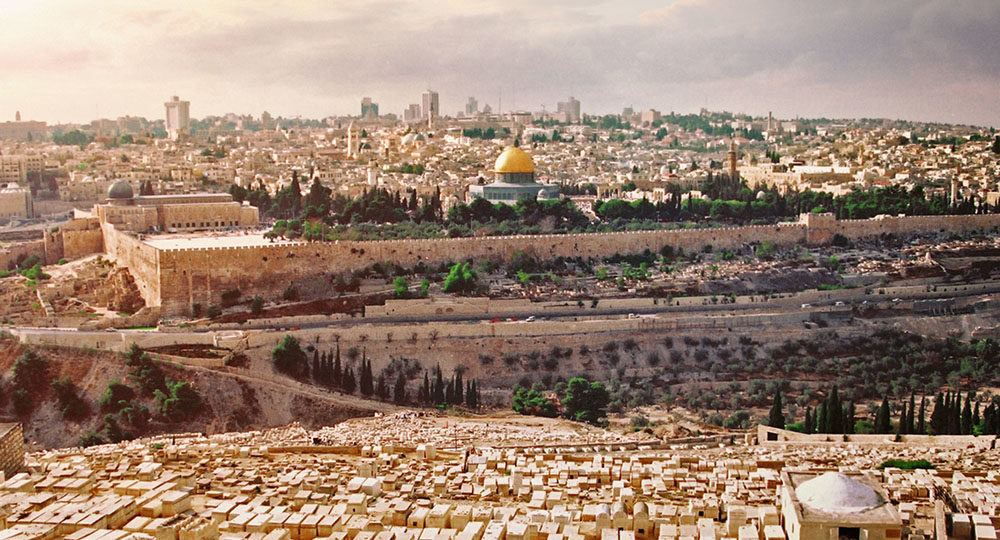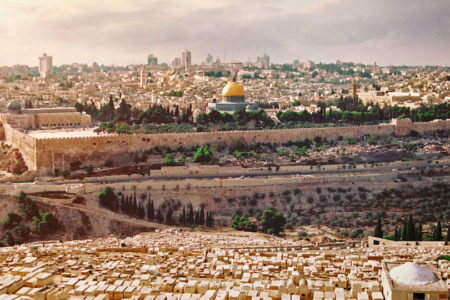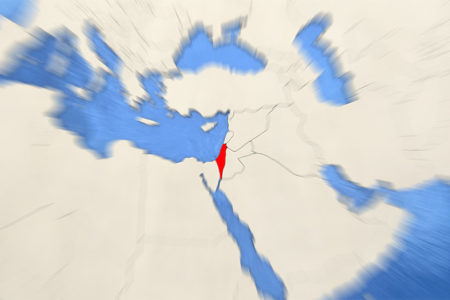The Best is Yet to Come
A look at God’s promises to Israel in Ezekiel 36—37
Leon Uris’s novel Exodus, about the founding of the State of Israel, captivated the world when it came out in 1958. It became an international sensation, rising quickly to number one on The New York Times best-seller list and staying there for eight months.
Two years later, Otto Preminger directed the film version. The “Theme of Exodus” is beautiful and has been sung by many recording artists over the years. But better still are the lyrics, written by popular singer Pat Boone. The opening lines sum up Ezekiel 36: “This land is mine. God gave this land to me.”*
God gave the physical descendants of Jacob the land of Israel, and the land is theirs—despite what most people think today. Others have tried to claim it, including elements within the church, and most of the world accuses Israel of “occupying” Arab territory. However, Ezekiel 36 states plainly the land belongs to God, who gave it to the Jewish people for an “everlasting possession” (Gen. 17:8, 48:4; Lev. 25:23). They forfeited it temporarily due to disobedience; but in the Almighty’s grand plan, they will flourish in it someday and testify to the entire world that Jehovah (YHVH) is God.
A Word to Israel’s Enemies
Over the centuries, God used many prophets to bring Israel messages of punishment and restoration. One of the clearest messages came through Ezekiel, who ministered to the Israelites as they languished in exile during the Babylonian Captivity in the sixth century BC. Ezekiel’s prophecy transcends the corridors of time and looks to the future, when the Lord will fully restore the land to Israel and punish those who took it for themselves:
“The enemy has said of you [Israel], ‘Aha! The ancient heights have become our possession.’” . . . Therefore thus says the Lord GOD: “Surely I have spoken in My burning jealousy against the rest of the nations . . . who gave My land to themselves as a possession, with wholehearted joy and spiteful minds, in order to plunder its open country. I have raised My hand in an oath that surely the nations that are around you shall bear their own shame. But you, O mountains of Israel, you shall shoot forth your branches and yield your fruit to My people Israel. . . . I am for you, and I will turn to you. I will multiply upon you man and beast; . . . I will . . . do better for you than at your beginnings. Then you shall know that I am the LORD. Yes, I will cause men to walk on you, My people Israel; they shall take possession of you, and you shall be their inheritance” (Ezek. 36:2, 5, 7–9, 11–12).
God promises the nations humiliation and punishment for their deeds. Yet to Israel He promises blessing. The Jewish nation will no longer “hear the taunts of the nations anymore, nor bear the reproach of the peoples” (v. 15).
Anti-Semitism is mushrooming today around the globe. Sometimes it seems as though the abuse of God’s Chosen People will never end. But God promises that someday it will be but a distant memory, and His people will enjoy a time of unparalleled blessing. This promise, however, contains two conditions, which God also promises to bring about: (1) The Jewish people must be regathered from the nations and (2) be in a close, personal relationship with Him.
Physical Restoration
God vows to plant the Jewish people back in their own land. He uprooted and dispersed them as punishment for their disobedience: “So I scattered them among the nations, and they were dispersed throughout the countries; I judged them according to their ways and their deeds. . . . They profaned My holy name” (vv. 19–20). Like many of us, they behaved in a manner that dishonored God.
God is holy, which means He is unique, different, and separate from everything else in the universe; and He calls His people to holy living. The Israelites were to be different, separated unto Him, and completely unconnected to the surrounding nations in order to maintain the purity of their relationship with the Lord and the Law He gave them. They were not to intermarry or engage in pagan practices. God even gave them dietary laws to prevent them from bonding over meals with their neighbors.
Apart from adhering to food restrictions, the Lord expects much the same of Christians today. We are to be in the world but not of it: “Do not be conformed to this world, but be transformed by the renewing of your mind” (Rom. 12:2). We are not to yield to society’s value system or love the things the world treasures: “Do not love the world or the things in the world. If anyone loves the world, the love of the Father is not in him” (1 Jn. 2:15).
Unfortunately, the Israelites wandered from God and “profaned” His holy name. The word profane means the opposite of holy. Profane means common, ordinary, and every day. Profanity, for example, takes God’s holy name and uses it in a low, common, or vulgar way. God said Israel “profaned [His] holy name” (Ezek. 36:20), provoking Him to anger. “But I had concern for My holy name, which the house of Israel had profaned among the nations,” He said (36:21).
God intended Israel to be His vehicle for impacting the godless Gentiles with the reality and knowledge of the one true God. Like the church today, Israel was to broadcast the light of almighty God to a lost world. As Christians, we also are called to holy living. We are to be “blameless and harmless, children of God without fault in the midst of a crooked and perverse generation, among whom you shine as lights in the world” (Phil. 2:15).
To profane God’s holy name assassinates His character—His very nature. That’s why He says, “But I had concern for My holy name. I will sanctify My great name” (Ezek. 36:21, 23).
The Hebrew word for “sanctify” appears only three times in the Bible and is closely related to the word holy. God was telling Israel that His great name was to be set apart, hallowed, and respected. Ultimately, this feat will be accomplished when the Jewish people are regathered to their land: “For I will take you from among the nations, gather you out of all countries, and bring you into your own land” (v. 24).
Israel’s physical restoration will cause the world to understand that “I, the LORD, have rebuilt the ruined places and planted what was desolate. I, the LORD, have spoken it, and I will do it” (v. 36). A partial restoration already has begun. But the Lord’s ultimate plan is for a full restoration and to have the Jewish people dwell in Israel in safety and in a proper relationship with Him because it will glorify Him.
Spiritual Regeneration
In Ezekiel 37, the Lord promises to regenerate the Jewish people spiritually, so they may have a close relationship with Him. Through a vision, God transported Ezekiel to a valley filled with sun-bleached, dry, dead bones. Then He asked His prophet, “Son of man, can these bones live?” (37:3).
What a question! The bones were immeasurable in number and “very dry,” having no vestiges of life (v. 2). Since when can something dead be reanimated and live?
Ezekiel’s response was simply, “O Lord GOD, You know” (v. 3). From a human standpoint, it certainly looked impossible that these dead bones could ever live again. But as God told Abraham, “Is anything too hard for the LORD?” (Gen. 18:14).
God then told Ezekiel, “Prophesy to . . . [the] bones, and say to them ‘O dry bones, hear the word of the LORD!’” (Ezek. 37:4). To prophesy here does not mean to foretell the future but, rather, to preach God’s Word. As Ezekiel preached, the “bones came together, bone to bone. . . . The sinews and the flesh came upon them, and the skin covered them over” (vv. 7–8). But something still was missing: “There was no breath in them” (v. 8).
They were alive physically but not spiritually. Then God commanded Ezekiel, “Prophesy to the breath, prophesy, son of man, and say to the breath, ‘Thus says the Lord GOD: “Come from the four winds, O breath, and breathe on these slain, that they may live”’” (v. 9).
To whom do these dead bones belong? “These bones,” God told Ezekiel, “are the whole house of Israel” (v. 11). It was not enough for them to be regenerated physically; they had to be regenerated spiritually. God was telling His prophet this dead nation would someday be resurrected, both physically and spiritually.
THE CHRISTIAN TRAVELER’S GUIDE TO THE HOLY LAND
Prepare for your own visit to Israel with The Christian Traveler’s Guide to the Holy Land by Charles H. Dyer and Gregory A. Hatteberg.
Today 6.59 million Jewish people live in Israel, according to the Central Bureau of Statistics. The Times of Israel reported in April 2018 that 43 percent of world Jewry now resides back in its homeland. God is making good on His promises.
However, spiritual regeneration requires the outpouring of the Holy Spirit, which will take place in the future, bringing Israel into a close personal relationship with Him: “I will put My Spirit in you, and you shall live, and I will place you in your own land. Then you shall know that I, the LORD, have spoken it and performed it” (v. 14).
The truth of Pat Boone’s words will someday become obvious to the entire world: “They shall dwell in the land that I have given to Jacob My servant, where your fathers dwelt; and they shall dwell there, they, their children, and their children’s children, forever” (v. 25).
In that day, Jewish people will be able to declare, “This land is mine. God gave this land to me.” And no one will argue with them.









Tom, I read this article twice, it is so clear and helps us to understand the teaching of the Holy Spirit concerning this portion of scripture. I feel so deeply that God is moving to the end of the end times that I look up and say in my heart ‘perhaps today,’ come Lord Jesus. Thank you Tom Simcox.
Thank you so much for this teaching. I love when the Holy Spirit opens our hearts to the knowledge of His Word!!
It is interesting how Ezekiel discusses God’s punishment by casting the Jews among the nations and that one day He will restore them to their land, but doesn’t mentioned that the ultimate casting was because they rejected their Messiah.
Does it mention anywhere in the old testament that God will disperse the jews because of their rejection of the Messiah?